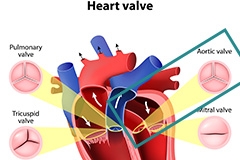Aortic Valve Disease: Keeping the Blood Flowing
The human heart resembles a finely tuned machine, with four valves opening and closing in precise order to keep the blood flowing – unless one them doesn’t work.
“The aortic valve is the main valve in allowing the blood to be pumped out of the heart,” says McLeod Cardiothoracic Surgeon Scot C. Schultz, MD. “Typically, we discover aortic valve disease when we hear a heart murmur through a stethoscope during a routine office visit. This murmur signals a turbulent flow in the heart, a primary sign of aortic valve problems.”
TYPES OF AORTIC VALVE DISEASE
Aortic valve problems appear in two different ways:
- Stenosis, the most common issue, occurs when the valve does not open enough to allow the blood to leave the heart.
- Regurgitation describes the valve failing to close completely, allowing blood to leak back into the heart.
SIGNS
Some patients may not experience any symptoms in the early stages of the disease. In time, they may notice the following:
- Fatigue or weakness
- Shortness of breath, especially when activeA heart that feels like it is pounding, racing or beating unevenly
- Chest pain often brought on by exercis
- Fainting or light headed feeling
- Some people feel “palpitations,” irregularities in the beat of the heart.
WHO IS AT RISK
Heart valves wear out over time, making advanced age one of the most important risk factors. As you age, the risk for developing calcium on the valves increases. This buildup of calcium can cause the leaflets of the valve to stiffen and narrow, limiting their motion and ability to properly open and close.
However, don’t think that you have heart disease, simply because you are tired – particularly if you are age 65 or older. As we age, we can all (unfortunately) fatigue more easily.
Other risk factors include:
- A previous bout with rheumatic fever, which damages the valve and
- Congenital valve disease that has been there since birth.
TESTING FOR VALVE DISEASE
If your primary care physician detects a problem, they will likely send you to a heart specialist for one or more tests:
- Echocardiogram (the gold standard) uses sound waves – similar to ultrasounds used on pregnant women – to take moving pictures of the heart. If the test doesn’t result in a satisfactory picture, the doctor may order other tests.
- Transesophageal Echocardiogram (TEE), also an ultrasound, captures images from inside the throat with a small flexible tube.
- Cardiac Catheterization shows how much the aortic valve is leaking and checks the health of the coronary arteries.
- Magnetic Resonance Imaging (MRI) checks the aortic valve and how well the heart is pumping blood.
TREATMENT
Your specialist may start by suggesting some lifestyle changes:
- Quit smoking and avoid second-hand smoke.
- Follow a heart-healthy diet.
- Be active. Ask your physician what type of exercise is safe for you.
- Obtain or stay at a healthy weight.
- If these changes don’t sufficiently improve your condition, you have many treatment options.
ACTION YOU CAN TAKE
If you think that heart valve disease is causing you problems, see your primary care physician, a cardiologist or call the McLeod Valve Clinic at 843-777-8258.
-
McLEOD REGIONAL MEDICAL CENTER FLORENCE
843-777-2000 -
McLEOD DARLINGTON
843-777-1100 -
McLEOD DILLON
843-774-4111 -
McLEOD LORIS
843-716-7000 -
McLEOD SEACOAST
843-390-8100 -
McLEOD CHERAW
843-537-7881 -
McLEOD CLARENDON
803-433-3000



-
McLEOD REGIONAL MEDICAL CENTER FLORENCE
843-777-2000 -
McLEOD DARLINGTON
843-777-1100 -
McLEOD DILLON
843-774-4111 -
McLEOD LORIS
843-716-7000 -
McLEOD SEACOAST
843-390-8100 -
McLEOD CHERAW
843-537-7881 -
McLEOD CLARENDON
803-433-3000
 Find a Doctor
Find a Doctor  Locations
Locations  Services
Services 